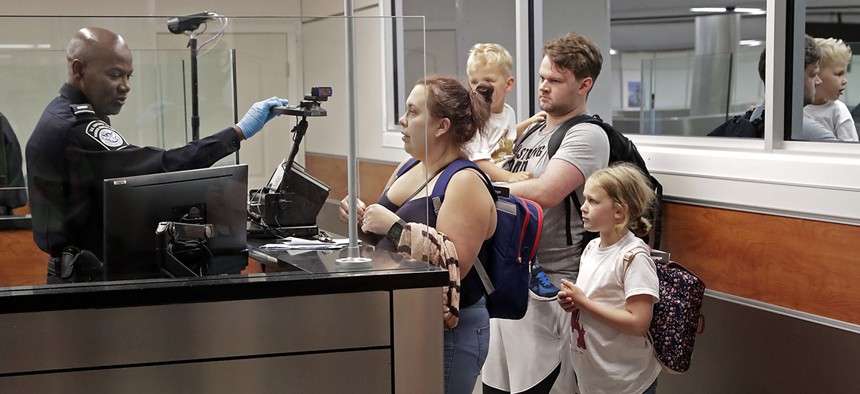U.S. Customs Expects Face Scanning to Speed Up Security at Florida Airport

A customs agent, left, adjusts a face recognition camera as he screens a family after their recent international flight arrival at Orlando International Airport, Thursday, June 21, 2018. John Raoux/Shutterstock.com
Using Homeland Security’s biometric program, one airport is increasing security while shortening lines.
Officials with Customs and Border Protection’s Entry/Exit have a way to shorten the long lines at airline gates while improving security and meeting an almost 15-year-old mandate from Congress.
Officials announced June 21 that Orlando International would be the first airport in the country to screen every international passenger using facial recognition technology. CBP has been running biometric pilots—including facial recognition—at 13 airports across the country but Orlando will be the first to use the system on all travelers.
In 2004, Congress charged the CBP with finding a way to apply biometric screening at all border crossings—including land, air and sea. The agency has struggled to comply, citing difficulties in finding the right technology to improve security without adding significant travel delays.
“We are at a critical turning point in the implementation of a biometric entry-exit system, and we’ve found a path forward that transforms travel for all travelers,” CBP Commissioner Kevin McAleenan said at a June 21 press conference. “The valuable collaboration with stakeholder partners like [the Greater Orlando Aviation Authority] has resulted in real momentum and it has brought us to where we are today, the first fully biometric entry-exit deployment at an airport.”
Currently, at airports across the country, inbound passengers on international flights had to stop at a kiosk to scan their passports, have their photos taken and answer customs inspection questions before getting in line to see a security officer. For foreign nationals that process is even longer, as CBP takes a fingerprint scan to match against passport records.
At Orlando International, the kiosks are gone, replaced by cameras behind security officials that take pictures of arriving passengers and matches those with passport photos on file in a matter of seconds. The cameras have a 99 percent accuracy rate and have eliminated the need for foreign nationals to go through fingerprinting, as facial recognition suffices for the biometric mandate, John Wagner, CBP deputy assistant commissioner and the senior executive overseeing Entry/Exit, told Nextgov.
On average, the kiosk system took one minute for U.S. citizen and two minutes and 30 seconds for non-citizens. Using the facial recognition cameras has brought the average down to 15 to 20 seconds, according to Wagner.
The system for departing passengers is not set up yet but has the potential to drastically improve customer experience at the gate.
Once established, the biometric cameras will register each passenger as they approach the gate and match their face to the passport and boarding information on record. This will allow passengers to walk right onto the gangway without an airline representative scanning and verifying each boarding pass.
During an initial pilot, one airline was able to board an entire plane in under 20 minutes.
“It’s a faster process and, on our end, it meets the biometric departure mandate,” Wagner said.
Wagner said Entry/Exit officials were having trouble figuring out how best to meet that mandate until they started looking at the problem from the perspective of the customers: both travelers and the airlines. While working with the airlines, officials found that installing facial recognition cameras that integrated with the airlines’ infrastructure would make for a seamless process that met everyone’s needs.
“We could have just put up gates and put it on the airports and airlines” to deal with the longer wait times and, inevitably, angrier passengers, Wagner said. Luckily for everyone, the facial recognition solution is expected to shorten wait times while meeting Entry/Exit’s mission.
For those with privacy concerns, Wagner noted that the data being collected through the facial recognition program is information passengers give to the airlines and federal security personnel already. “We’re just using it in a way that makes it easier for you to travel,” he said.
Currently, the photos of U.S. citizens are stored for 14 days in order for CBP to run analytics on the program. Soon, those photos will be deleted immediately after the security official clears that passenger, Wagner said. Photos of foreign nationals are kept in the IDENT database for 75 years as part of their travel record.
CBP designed the underlying system and infrastructure in-house, then purchased the recognition algorithm from a third-party vendor. The algorithm is able to adjust for changes in a person’s appearance, including glasses, hair color, changes to facial hair and even plastic surgery, Wagner said.
“We are committed to delivering a premier travel experience to Orlando International Airport’s more than 5 million annual international passengers,” Phil Brown, CEO of the Greater Orlando Aviation Authority, said during the press conference. “By incorporating biometric technology into our entry and exit processes, safety, security and speed are optimized so customers can enjoy a more streamlined and comfortable journey through Florida’s busiest airport.”
Editor's note: This article was updated to clarify how long CBP stores photos.
NEXT STORY: When a Mars Simulation Goes Wrong






